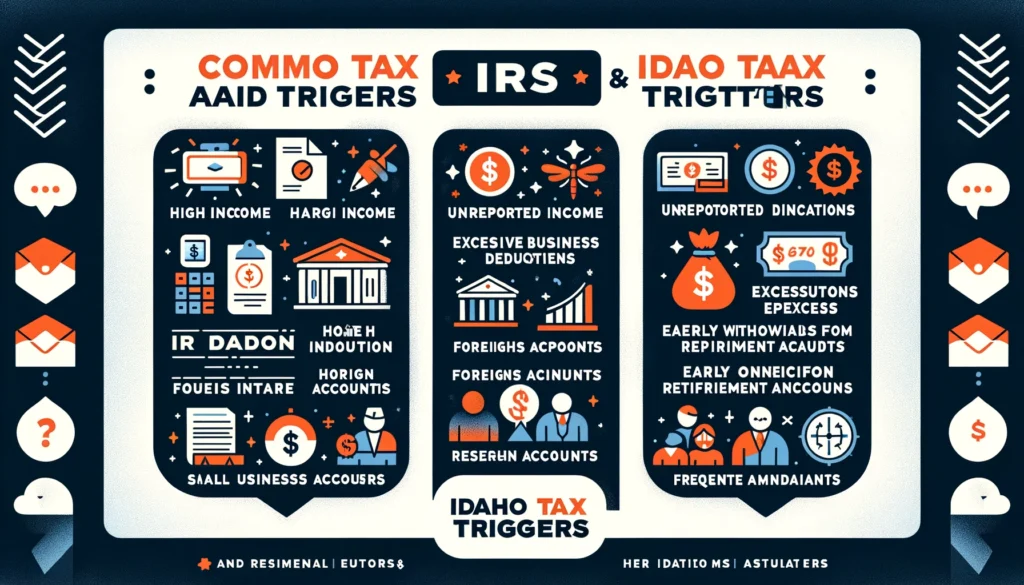Tax audits can be a daunting prospect for any taxpayer. Understanding what might trigger an audit can help you navigate the complexities of tax filing and reduce the likelihood of facing one. This article will explore the common triggers for audits by both the IRS and the Idaho State Tax Commission, as well as provide practical advice on how to mitigate the risk of being audited.
Common IRS Audit Triggers
-
High Income
- Taxpayers with higher incomes are more likely to be audited. The IRS tends to scrutinize returns with income over $200,000 more closely. This is because higher income earners have more opportunities to utilize complex tax strategies that could potentially reduce their tax liability. Therefore, the IRS pays more attention to ensure compliance.
-
Large Charitable Donations
- While charitable contributions are tax-deductible, unusually large donations compared to your income may raise red flags. If you claim significant charitable contributions, make sure you have proper documentation, such as receipts and acknowledgment letters from the charities, to substantiate your claims. The IRS may require proof that the donations were made and that the organizations qualify as charitable under IRS rules.
-
Unreported Income
- Failing to report all taxable income, including side jobs and investment gains, can trigger an audit. The IRS receives copies of W-2s and 1099s and matches them against your return. If there is a discrepancy, it will likely be flagged. Ensure that you report all income sources accurately and keep records of any freelance or gig work, investment income, and other taxable earnings.
-
Home Office Deductions
- Claiming a home office deduction can be legitimate, but it’s often scrutinized because of potential abuse. To qualify for a home office deduction, your home office must be used exclusively and regularly for business purposes. Keep detailed records of your home office expenses, such as utilities, rent or mortgage interest, and maintenance costs, and be prepared to demonstrate how your home office meets IRS requirements.
-
Excessive Business Expenses
- Deductions that seem disproportionately high compared to your income, especially if you’re self-employed, can prompt an audit. For example, claiming travel, meals, and entertainment expenses that appear extravagant may raise suspicions. Maintain detailed records, including receipts and explanations of the business purpose for each expense, to substantiate your deductions.
-
Foreign Accounts
- U.S. taxpayers with foreign accounts exceeding $10,000 at any point during the year must file an FBAR (Foreign Bank Account Report). Failure to report these accounts can lead to an audit. The IRS is particularly vigilant about foreign income and assets due to concerns about tax evasion. Make sure to report all foreign accounts and comply with FBAR and other reporting requirements, such as the Foreign Account Tax Compliance Act (FATCA).
-
Early Withdrawals from Retirement Accounts
- Withdrawals from IRAs or 401(k) accounts before age 59½ often incur penalties and must be reported. Failure to do so can attract IRS attention. If you take early withdrawals, ensure that you report them accurately and pay any applicable penalties and taxes. Be aware of the exceptions to the penalty, such as withdrawals for certain medical expenses, education costs, or first-time home purchases.
-
Mathematical Errors
- Simple math errors on your tax return can trigger an audit. Double-check calculations or consider using tax software to minimize mistakes. Math errors can lead to underreporting of income or overclaiming of deductions, which can draw scrutiny from the IRS. Using tax preparation software or hiring a tax professional can help reduce the likelihood of such errors.
Common Idaho State Tax Audit Triggers
-
Discrepancies Between Federal and State Returns
- Idaho tax authorities often compare state returns with federal returns. Any inconsistencies can lead to an audit. Make sure your state return aligns with your federal return, particularly regarding income, deductions, and credits. If you amend your federal return, promptly amend your state return as well to avoid discrepancies.
-
High-Value Deductions and Credits
- Large deductions or credits that significantly reduce your taxable income may prompt further scrutiny. For instance, claiming substantial business expenses, education credits, or renewable energy credits can raise questions. Ensure that you have proper documentation and that your claims are within the guidelines established by Idaho tax laws.
-
Small Business Owners and Self-Employed Individuals
- Similar to the IRS, Idaho closely examines returns from small business owners and the self-employed, focusing on income reporting and business expenses. Self-employed individuals often have more complex tax situations, with numerous deductions and credits. Keeping meticulous records and using accounting software can help manage your business finances and provide accurate tax information.
-
Frequent Amendments
- Regularly amending your tax return can trigger an audit as it may indicate issues with your initial filings. While amendments may be necessary to correct mistakes or claim overlooked deductions, multiple amendments can raise red flags. Strive for accuracy in your initial filing, and if amendments are necessary, provide clear explanations and supporting documentation.
-
Cash Businesses
- Businesses that primarily deal in cash, such as restaurants and salons, are more likely to be audited due to the potential for underreporting income. The Idaho State Tax Commission is aware that cash businesses can have higher risks of unreported income. Implementing rigorous internal controls, maintaining detailed records, and depositing all cash receipts into a business bank account can help ensure accurate reporting.
How to Reduce Your Audit Risk
-
Accurate and Complete Reporting
- Ensure all income, deductions, and credits are accurately reported and substantiated with proper documentation. Double-check your tax return for errors and omissions before filing. Consider using tax preparation software or consulting a tax professional to enhance accuracy.
-
Consistent Filing
- Maintain consistency between your federal and state tax returns to avoid raising any flags. Discrepancies can trigger audits from both the IRS and state tax authorities. If you discover an error on your federal return, promptly amend your state return to reflect the correction.
-
Use Professional Help
- Consider hiring a tax professional, especially if your tax situation is complex. They can help ensure your return is accurate and compliant with all regulations. Tax professionals are knowledgeable about current tax laws and can provide valuable advice on tax planning and compliance.
-
Keep Detailed Records
- Maintain comprehensive records of all financial transactions, receipts, and documentation to support your tax return. Organized records make it easier to substantiate your claims and respond to any inquiries from tax authorities. Keep records for at least seven years, as the IRS can audit returns for up to six years if substantial underreporting of income is suspected.
-
Be Mindful of Red Flags
- Be aware of common audit triggers and take steps to mitigate them. For example, if you have significant charitable contributions, ensure they are documented and reasonable relative to your income. If you claim a home office deduction, make sure your home office meets IRS requirements.
-
Stay Informed
- Keep up to date with changes in tax laws and regulations that may affect your tax situation. Tax laws can change frequently, and staying informed can help you avoid unintentional errors and take advantage of available deductions and credits.
-
Avoid “Too Good to Be True” Tax Schemes
- Be cautious of tax schemes or strategies that promise significant tax savings with little basis in tax law. The IRS and state tax authorities are vigilant about identifying and prosecuting tax fraud. If a tax strategy seems too good to be true, consult a reputable tax professional for advice.
Responding to an Audit
If you receive an audit notice, don’t panic. Follow these steps to handle the situation effectively:
-
Read the Notice Carefully
- Understand what the audit is about and what information the IRS or state tax authority is requesting. The notice will specify which tax years are under review and what documents you need to provide.
-
Gather Documentation
- Collect all relevant records and documentation to support your tax return. This may include receipts, bank statements, contracts, and correspondence related to your tax claims.
-
Respond Promptly
- Adhere to the deadlines specified in the audit notice. Failure to respond in a timely manner can result in penalties and additional scrutiny.
-
Consult a Tax Professional
- If you are unsure how to respond or if the audit is complex, consider hiring a tax professional to represent you. They can help you navigate the audit process and communicate with the tax authorities on your behalf.
-
Be Honest and Cooperative
- Provide accurate information and cooperate with the auditor. Attempting to conceal information or providing false documentation can lead to serious consequences, including additional penalties and potential criminal charges.
-
Understand Your Rights
- Taxpayers have rights during the audit process, including the right to professional and courteous treatment, the right to privacy and confidentiality, and the right to appeal the audit findings. Familiarize yourself with these rights and ensure they are respected during the audit.
Conclusion
Understanding the common triggers for IRS and Idaho tax audits can help you take proactive steps to reduce your audit risk. By ensuring accurate reporting, maintaining consistent filings, using professional help, and keeping detailed records, you can confidently navigate tax season and avoid the stress of a potential audit. If you do receive an audit notice, responding promptly and cooperatively while seeking professional guidance can help you effectively manage the audit process. Staying informed and vigilant about your tax responsibilities will not only reduce your audit risk but also contribute to a smoother and less stressful tax experience.



